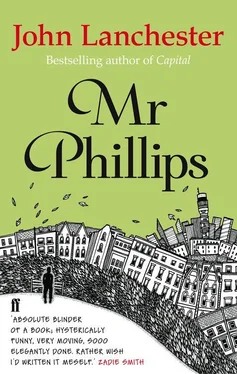‘Magazine publishing. Top shelf. London Publishing Company Inc., Mr Fortesque, Managing Director.’ Now the man is offering a card, which Mr Phillips takes. It says the same things as the man has just said.
‘I like to come to the park to get ideas,’ says the man, joining Mr Phillips at a strolling pace. ‘Basic research. I come here, look around, look at girls, look at men looking at girls, try and cook up some ideas based on what I see. Tennis now: there’s a thought. A whole magazine based on girls playing tennis — girls leaning over showing their bums, glimpses of tit when they throw up the ball, that sort of thing. Story ideas: the lesbian initiation in the locker room. It’s a well-known fact that half of them are big-time dykes. Awhole series of stories right there: first time, two on one, the shower scene, rivals kissing and making up and making out, suggestive use of rackets, all this is just off the top of my head. Prose narratives as well as picture layouts. Letters from readers, maybe we’d even get the occasional genuine one every now and again, with anecdotes and reminiscences and suggestions for future issues. The figure of the tennis coach, something for the ladies. You could do something with readers’ wives, too — amateur stuff, very nineties. The beauty of that is the worse it is the better, up to a point anyway. I can judge that point. That’s what experience means. It’s as valuable in this game as in any other. Niche markets. This whole Asian babes, fat girls, thin girls, big tits, teen totty, it’s been as far as it goes and we’re ready for the next big thing. That could be specialization by jobs and milieu — not just tennis players but nurses, policewomen, traffic wardens, secretaries. Let’s face it, why do you think people watch tennis on the telly in the first place? To get new ideas about the placement and timing of their forehands? Bollocks. It’s for the totty. It’s basically about women’s knickers. They should have a camera trained on them as they serve, a super-slow motion Knicker-Cam. Or Totty-Cam? You have to give people what they want. Think of that photo with the girl’s skirt hitched up and her rubbing her bum. Just a glimpse of cheek, that’s all you really get — but what a classic. Not that it makes much sense. Is she supposed to have been hit on the arse by the ball, or what? And why isn’t she wearing any knickers? Go brilliantly in a story shoot, that would.’
‘I used to fancy my secretary,’ admits Mr Phillips. They have gone as far as the Thames and are looking across the river towards Chelsea. He came here with Mrs Phillips when they were courting. ‘It’s like a Canaletto,’ she had said, and he had agreed, not having the faintest idea who Canaletto was. Now he did know, and although he didn’t think it was particularly true, he knows what she meant, and in any case always thinks of it when he sees that stretch of trees and houses and riverbank.
‘Of course you did. Everybody fancies their secretary. That’s what offices are all about.’
‘I often used to wonder if she thought about me in the same way,’ says Mr Phillips, truthfully. There are whole parts of sexy Karen’s mind that are wholly unguessable to him — which was of course a large component of what made her sexy.
‘Why speak in the past tense? I’m sure she’s thinking about you right now. Not that it matters. Speaking as a pornographer, I can tell you that the important thing is never to try and work out what a woman is thinking. It only confuses you and they change their minds so much anyway the main thing is just to steam ahead with your plan intact.’
‘I lost my job’, says Mr Phillips.
‘Why else would you be wandering around Battersea Park at half past nine on a work day? Naturally you haven’t told your wife and family,’ says the man.
‘No, I haven’t’.
‘And this was — last week? Last month? Last October?’
‘Friday,’ says Mr Phillips.
‘Friday!’
‘Friday morning.’
The man smokes for a while, looking at an unladen barge heading up the Thames. More dangerous than it looks; if you fall in you’re dead in no time.
‘It’s always a shocker,’ says the pornographer. ‘I haven’t been sacked for years — it’s one of the perks of being your own boss — but in the days when I worked for other people it used to happen all the time. I’ve been sacked for being drunk, for being chronically late, for being lazy, and then for planning to nick personnel and ideas and set up my own company — which was justified, incidentally. But then so were all the others. In retrospect, mind — I’m not claiming that’s what I felt at the time. But when they sacked me for disloyalty, instead of being something I was thinking about doing it became something I had to do, and the next thing you know I was my old firm’s biggest competitor. They publish traditional tit mags — still stuck in the seventies, basically.’ He ponders his own success for a moment, and then says in a different tone, ‘Mind you, even when you see it coming it’s an upset.’
‘I can’t say that I saw it coming,’ says Mr Phillips. And this was true. One of his least favourite parts of the job, as deputy chief of accounts at Wilkins and Co., had been preparing breakdowns of the cost of making employees redundant. This was something he did in concert with Mr Somers, the deputy head of the legal department. You checked the contract and did the sums. Then, inevitably, you bumped into the person about whom you had just been preparing the figures. Once Mr Phillips had spent an hour stuck in a lift with a man from the marketing department whose sacking he had been costing that very morning. His contract meant he was due six months’ pay, so it wasn’t cheap — though as Mr Mill, the drunk, idle and unreliable head of accounts, was wont to point out, ‘There’s always money for redundancies.’ In the stationary lift they had talked about football for most of the hour, until some firemen came, apologizing for being so slow but saying they’d had to come via a chip pan blaze at a nurses’ hostel in Holborn.
Someone in accounts must have run a ruler over his own dismissal, he realizes. It couldn’t have been Monroe, since they would have known that Monroe would have told him and in any case he couldn’t have kept it secret, given that they shared an office. It wouldn’t have been Mr Mill, who wasn’t up to anything more complicated than the two times table, and even that only before lunch. If they were looking for highish-level redundancies in accounts, Mill was lucky not to have been sacked himself. But as a director of the company he was on a year’s notice, and therefore prohibitively expensive to sack, notwithstanding his own rule. Mr Phillips’s old partner in crime Mr Somers must have known. Not that Mr Phillips would have been expensive or complicated to sack, with a straightforward three-month notice period and no tricky nonsense over bonus schemes or anything like that. They had promised to pay his pension contributions for two years or until he got another job, whichever was sooner. So this was it: redundancy.
The interview or meeting or conversation with Mr Wilkins, the managing director, at which the news was broken, had been like a flashback to school and the time he was caned for being part of a group who smashed some windows in an after-hours throw-a-rock-over-the-gym competition. On that occasion the headmaster had not actually said the words ‘This is going to hurt me more than it hurts you,’ but the sentiment was implicit in his pained, actorish demeanour. Mr Wilkins was like that too. Mr Phillips, once he realized what the purpose of the meeting was — which didn’t take long — was in a state of complete numbness and only heard the gist of what the company’s eponymous paramount chief had to say.
Читать дальше




![Unknown - [Carly Phillips] The Bachelor (The Chandler Brothe(Bookos.org) (1)](/books/174132/unknown-carly-phillips-the-bachelor-the-chandle-thumb.webp)







